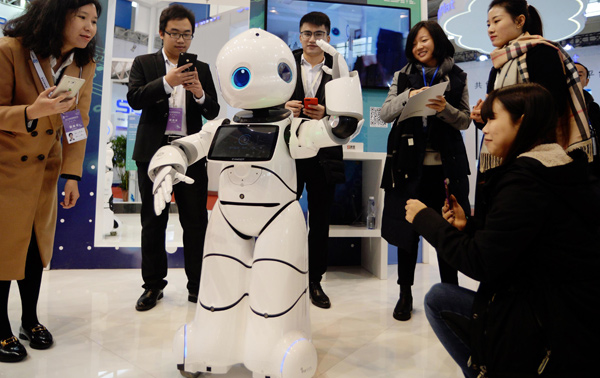Entrepreneurs work on innovative inventions to make life better


When Wang Wenxin presented his undergraduate entrepreneur project on a sludge cleaning robot to Nobel and Turing Award laureates in competition with cutting-edge inventions from worldwide experienced researchers, he was nervous but confident.
"Their projects are at the forefront of technological innovation. But we still have our own advantage of focusing on addressing weak links in city infrastructure and having great development potential," Wang said on the sidelines of the Global Final of Seed Award 2019, which ended recently in Shenzhen, Guangdong province.
His student team managed to create a low-cost robot that could clean the sludge blocking tunnel and sewer systems, helping solve the problem of water-logging in many cities.
"I believe that we ordinary people could also make achievements in technological innovation, which does not solely belong to top-level experts," said the young Chinese entrepreneur.
His project was one of the Top 10 Creators selected by the Seed Award 2019, which aims to reward and encourage the "creators", or those who are passionate in applying technologies in life scenarios to create better human living conditions, and inspire more people to join their endeavors.
More than 1,300 individuals and teams participated in the contest worldwide. They ranged from teenage students to professors in their 70s and exhibited their innovations in the areas of medical care, smart devices, new energy, and the internet of things among others.
Israel-based biotechnology company Matricelf was awarded the Grand Prize of 1 million yuan ($142,554) for his team's creation of the world's first 3D-printed human heart with no artificial materials that could cause a negative immune response.
The project has the potential of saving the lives of scores of people suffering from cardiovascular disease who cannot find heart donors.
The global final also awarded the three Talent Prizes of 200,000 yuan to NoBarriers.ai, which used bioelectric signals and artificial intelligence to translate sign language, Sana Health which invented wearable headsets to relive chronic nerve pain, and California-based electric aircraft developer Ampaire.
Joseph Sifakis, a judging panel member of the global final and a Turing Award laureate, said the contest has a positive impact on the development of tech industries by giving innovative talents the opportunity to exhibit their ideas.
"We aim to find and encourage the individuals and teams that are at the early stage of scientific innovations that are in need of support," said K.K. NG, chief marketing officer with Chinese real estate company Seedland Group, the organizer of the contest.
Seed Award called for more investors, enterprises and individuals to keep patient when nurturing innovative projects, NG said.
"Just like a seed that needs sunshine, water and time to grow into trees, we need to give, to wait, and even to tolerate for big ideas to develop," she said.
"Global participation allowed the award to bring the world's cutting-edge innovations aiming to solve the problems jointly faced by the human community to the public. This allowed more people to see the hope of a better life in the future," NG added.




































